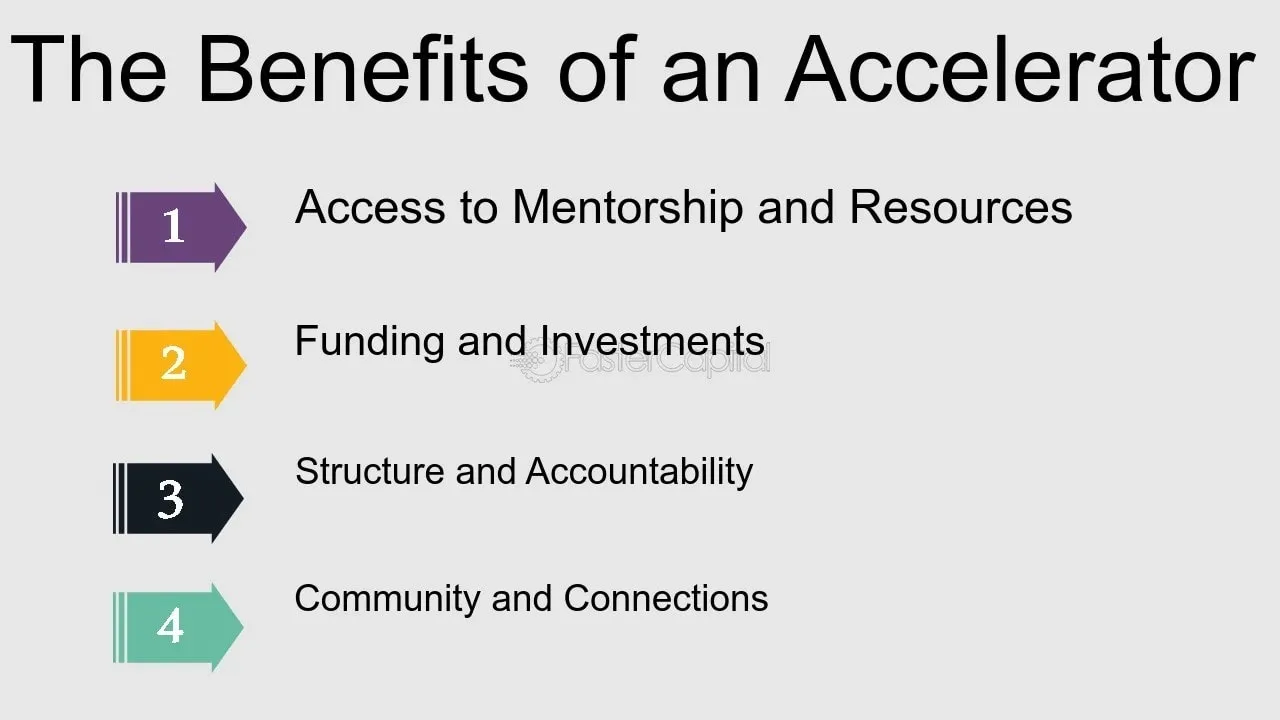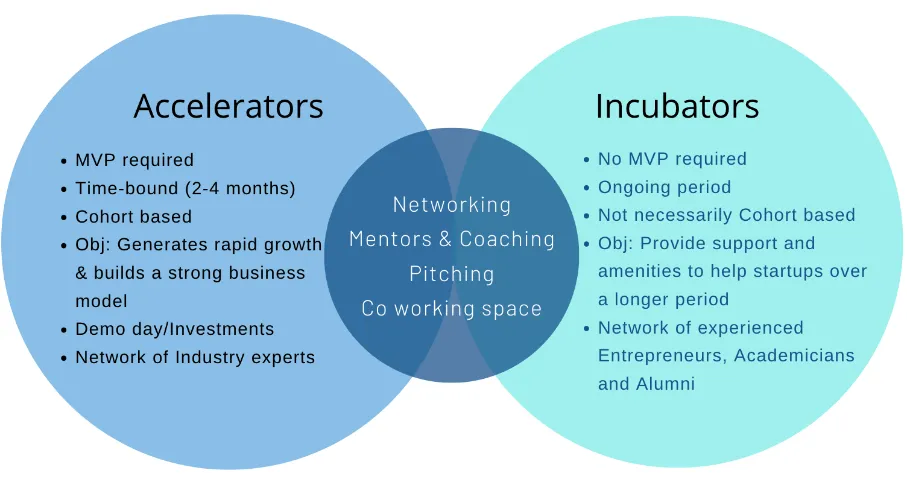Accelerators are structured programs designed to help startups grow rapidly by providing mentorship, funding opportunities, and essential resources.
In simple terms, an accelerator is a program that supports early-stage startups in refining their business model and scaling quickly. If you’re running a startup, these programs can guide you through key challenges in just a few months.
Did you know that startups graduating from top accelerators like Y Combinator raise an average of $1.7 million within a year? By connecting founders with industry experts, venture capitalists, and angel investors, accelerators offer the tools and network needed to take your startup to the next level.
What Are Startup Accelerators?

Startup accelerators are programs designed to help early-stage companies grow quickly and efficiently. They typically provide startups with resources such as mentorship, funding, and networking opportunities in exchange for equity. These programs are often short-term, lasting a few months, and focus on preparing innovative startups to enter the market or attract potential investors.
Unlike startup incubators, which provide physical space and long-term support, accelerators are more intensive and structured. Many well-known accelerators, such as Y Combinator, offer seed accelerator programs that help startups refine their product-market fit and build a solid business model.
Accelerators work by offering mentorship from experienced entrepreneurs and industry experts. They connect startups with venture capital firms, angel investors, and other accelerators to create funding opportunities and establish valuable relationships. For startup founders looking to accelerate their growth in a competitive startup ecosystem, these programs can be a transformative experience.
How Do Accelerator Programs Work?

1. Structured Programs with a Clear Timeline
Accelerator programs are typically structured, running for a few months with a focused timeline. Unlike startup incubators, they emphasize rapid growth over a short period rather than providing long-term support.
2. Support Through Mentorship and Resources
Accelerators provide access to experienced entrepreneurs and industry experts who guide startups in refining their business model. This mentorship helps startups overcome challenges like achieving product-market fit and customer acquisition strategies.
3. Opportunities for Funding and Investment
Many accelerators provide funding to startups in exchange for equity. They also connect startups with potential investors, including venture capital firms and angel investors, to secure additional funding. Programs like Y Combinator and other well-known accelerators have a strong reputation for opening these doors.
4. Collaborative Workspace and Networking
Some programs offer office space or a tech center where startups can collaborate with others in the same cohort. This fosters a sense of community and learning from peers who share similar principles and challenges.
5. Preparation for Demo Day
The program typically concludes with a demo day, where startups showcase their business to investors and stakeholders. This is a crucial moment for startups to secure investment opportunities and gain visibility in the startup ecosystem.
By following a structured and intensive approach, accelerators provide startups with the tools and networks they need to accelerate their growth effectively.
How Do Startup Accelerators Benefit Early-Stage Startups?

1. Help in Developing a Strong Business Model
Startup accelerators assist early-stage companies in refining their business model, ensuring they align their products or services with market needs.
Unlike other business accelerators, these programs focus specifically on early-stage startups, guiding them through key challenges and helping them identify gaps in their strategies.
2. Access to Venture Capital and Investors
Startup accelerator programs often connect startups with venture capital firms, angel investors, and other funding opportunities. Programs like Y Combinator are well-known for providing funding and offering direct access to a network of investors.
This exposure helps startups present their ideas effectively to potential investors during demo days.
3. Increased Market Visibility
Participating in a well-known accelerator program adds credibility to a startup. Whether it’s being part of a Silicon Valley accelerator or a local tech center, startups gain recognition in the startup ecosystem.
This increased visibility can attract potential customers, investors, and even strategic partnerships.
4. Support for Innovation and Growth
Accelerators foster innovation by encouraging early-stage companies to experiment and iterate quickly.
Established startups that graduate from these programs often cite their accelerator experience as transformative, particularly in achieving product-market fit and scaling efficiently. They also offer resources like office space to create a collaborative environment.
5. Resources for Scaling Operations
Beyond funding, accelerators provide physical space, access to management tools, and guidance from experienced entrepreneurs.
This comprehensive support ensures startups are well-equipped to handle the complexities of scaling their operations.
6. Long-Term Startup Success
Accelerators provide more than short-term benefits. By connecting startups with business leaders, the programs create lasting impacts, helping companies thrive beyond the accelerator program.
Success stories from such programs often highlight the foundational support that accelerators provide, setting startups on a path to long-term success.
These benefits make startup accelerators a valuable resource for innovative startups aiming to grow strategically and sustainably.
Are Accelerator Programs Right for Your Startup?

Determining whether an accelerator program is the right fit for your startup involves evaluating your current stage, needs, and future goals. Here’s how you can decide:
1. Assess Your Startup’s Stage
- Accelerator programs are most beneficial for early-stage companies or tech startups that are in the process of developing their business model or scaling.
- If your startup has a minimum viable product (MVP) and is ready to test it in the market, a startup accelerator program can provide the necessary support to refine and scale your offering.
2. Evaluate Your Funding and Mentorship Needs
- If securing funding is a top priority, accelerators can connect you with investors while also providing mentorship from experienced entrepreneurs.
- Over the past decade, accelerator programs have evolved to include structured mentorship, helping startups develop leadership within their management team and address challenges more effectively.
3. Consider Scalability Readiness
- Startups ready to scale quickly can benefit greatly from the resources and networks provided by accelerator programs.
- These programs are especially useful for tech startups aiming to expand rapidly in competitive markets, as they offer access to venture capital firms, industry experts, and strategic advice.
4. Define Your Long-Term Vision
- A startup accelerator program is ideal for founders who have a clear vision for the future of their business.
- Whether your goal is to attract investors, grow your market presence, or build a strong management team, accelerators provide a focused environment to align your short-term actions with long-term goals.
By carefully evaluating your startup’s stage, needs, and vision, you can decide if an accelerator program is the right next step to help you achieve sustainable growth.
How to Choose the Right Startup Accelerator?

Finding the right startup accelerator can make a significant difference in your startup's growth. Here’s a step-by-step approach to guide you:
1. Define Your Goals
Choosing an accelerator starts with understanding your startup’s unique needs and objectives. Whether you're looking for funding, mentorship, or resources, your goals will help narrow down the options.
How to Do It:
- List your short-term and long-term goals (e.g., launching a minimum viable product or expanding market reach).
- Determine if you need a business accelerator focused on scaling or an early-stage program for foundational growth.
- Ensure the program aligns with your vision for your company.
2. Research Track Records
Look for accelerators with a history of success stories and tangible results. Programs with well-known alumni can be more effective in building your startup's credibility.
How to Do It:
- Check if most startups in the program succeed post-graduation.
- Look into the success stories from alumni, especially in your industry.
- Research accelerators with strong connections to investors, including angel investors and venture capital firms.
3. Evaluate Industry Relevance
The right accelerator should understand your market and offer tailored support. Industry-specific programs can offer better resources and connections.
How to Do It:
- Prioritize accelerators that specialize in your niche, whether it’s tech startups or innovative industries.
- Avoid programs with a broad focus if your startup requires specific expertise.
- Seek industry experts among the mentors and advisors.
4. Review Mentors and Resources
Mentorship is a critical factor in the success of any accelerator program. Strong resources, including office space or access to technical tools, can further enhance the experience.
How to Do It:
- Verify the expertise of mentors and their track records with similar businesses.
- Check if physical space or virtual resources are part of the program.
- Assess if they provide resources for developing a minimum viable product or scaling operations.
5. Compare Funding and Equity Terms
Accelerators often provide funding in exchange for equity, but the terms can vary significantly. Choose a program that offers fair and transparent agreements.
How to Do It:
- Analyze the equity terms and ensure they align with your business goals.
- Compare funding opportunities and what other benefits come in return.
- Avoid programs that require equity without offering substantial support or resources.
6. Consider Location and Networking
The location of the program can impact networking opportunities and access to industry hubs. Programs in startup ecosystems like Silicon Valley often offer better exposure.
How to Do It:
- Evaluate if the program’s location provides access to the right connections and resources.
- Consider accelerators with strong ties to business leaders and venture capitalists.
- Look for programs offering opportunities to connect with peers and potential investors.
By focusing on these aspects and using the structured steps under each, you can find the accelerator that fits your startup’s needs and drives long-term success.
What’s the Difference Between Accelerators and Incubators?

Understanding the differences between accelerators and incubators can help startups choose the right program for their needs. Here’s a breakdown of key distinctions:
1. Program Duration
Accelerators are short-term programs lasting 3 to 6 months, designed for startups ready to scale quickly. Incubators, on the other hand, typically provide long-term support that can last up to a few years, helping startups build a strong foundation.
2. Focus on Growth vs. Development
Accelerators focus on growth, providing resources to scale operations and attract investors. Incubators prioritize development, helping startups refine their business model or product before entering the market.
3. Stage of Startup Support
Accelerators work with early-stage startups that have a minimum viable product and are looking to expand. Incubators, however, often support startups in their ideation phase, even before they have a concrete product or service.
4. Funding Opportunities
Accelerators provide funding opportunities, often in exchange for equity, and connect startups with venture capital firms and angel investors. Incubators generally do not offer direct funding but may provide free or subsidized resources like office space.
5. Mentorship and Guidance
Both programs offer mentorship, but accelerators typically provide access to experienced entrepreneurs and industry experts focused on rapid growth. Incubators take a broader approach, offering more general support over time.
6. Structure and Goals
Accelerators have a structured curriculum with clear goals and milestones, such as preparing startups for demo day. Incubators have a more flexible structure, adapting to the unique needs of each startup.
7. Networking and Exposure
Accelerators prioritize networking, offering exposure to investors, mentors, and peers through events like demo days. Incubators focus on collaboration within their community and may lack the investor-focused exposure of accelerators.
8. Equity Requirements
Accelerators often require startups to exchange equity for funding and resources. Incubators typically do not take equity, making them a better choice for startups wanting to retain full ownership.
By weighing these differences, startups can make informed decisions about which program aligns with their goals and stage of development.
How Can Early-Stage Startups Apply to Accelerator Program?

1. Research Suitable Programs
Look for accelerator programs that align with your startup’s goals, industry, and stage of development. Check their track records, alumni success stories, and funding opportunities to ensure the program meets your needs.
2. Prepare Your Business Plan
Develop a clear and concise business plan that outlines your vision, business model, target market, and growth strategy. Highlight the unique value of your product or service.
3. Create a Compelling Pitch Deck
Design a professional pitch deck that effectively communicates your startup’s purpose, market opportunity, financial projections, and long-term goals. Keep it visual, focused, and persuasive.
4. Highlight Your Team’s Strengths
Showcase the expertise of your management team, emphasizing their experience, industry knowledge, and problem-solving skills. Investors value strong teams as much as strong ideas.
5. Understand the Application Process
Familiarize yourself with the program’s application requirements and deadlines. Some programs may require additional documents, such as a demo or product prototype.
6. Submit a Strong Application
Ensure your application is complete, professional, and tailored to the accelerator program. Clearly articulate why your startup is a good fit and how the program can help you achieve your goals.
7. Prepare for Interviews or Pitches
Practice delivering a confident and engaging pitch. Be ready to answer questions about your business, market, and plans for scaling.
8. Follow Up with the Program Team
After submitting your application or completing an interview, send a polite follow-up email to thank them and express your enthusiasm for joining the program.
By following these steps, early-stage startups can maximize their chances of securing a spot in a competitive accelerator program.
Conclusion
Accelerators provide startups with practical tools like mentorship, funding, and industry connections to grow effectively. They are designed to support early-stage companies in refining their business model, scaling operations, and accessing critical resources.
By joining an accelerator, startups can gain valuable insights, connect with investors, and prepare for long-term growth.
Choosing the right program requires careful research and understanding of your goals, but the benefits can be significant. For startups ready to take the next step, accelerators offer a clear and focused path to building a stronger, more sustainable business.

.webp)







